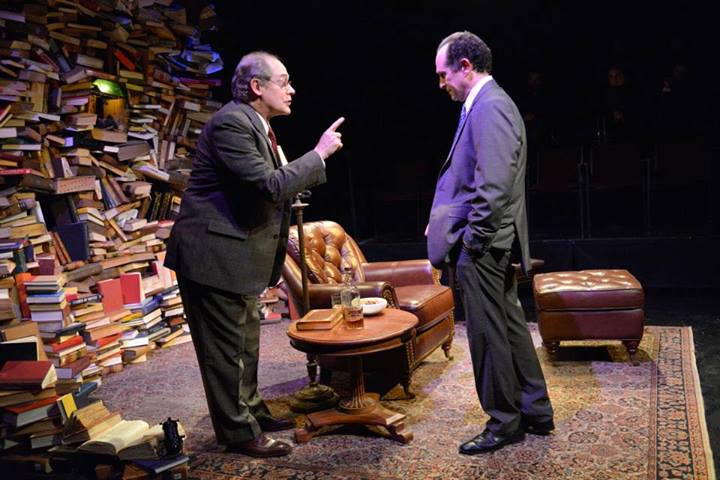
Joel Colodner as Solomon Galkin and Jeremiah Kissel as Bernard Madoff in IMAGINING MADOFF by Deborah Margolin. Photos by Andrew Brilliant / Brilliant Pictures.
Presented by New Repertory Theatre
by Deborah Margolin
Directed by Elaine Vaan Hogue
Arsenal Center for the Arts
Watertown, MA
January 4th – 26th, 2014
New Rep on Facebook
Review by Craig Idlebrook
(Watertown) It is in our genetic makeup to try and understand what we cannot comprehend, no more so than when we are confronted with evil that makes a mockery of human decency. We want to know what makes the mass murderer different from us so badly that we desperately try to project understanding when there is none to be had.
Unfortunately, this tends to make us seek black and white answers to complex and disturbing questions. Growing up in a Roman Catholic household, I kept asking my mother who was in Hell besides Hitler. She would pause and respond, “Mussolini.” That was always the end of the conversation.
This oversimplification of evil is the Achilles’ heel of Imagining Madoff, an otherwise devastatingly-good play examining the psychology behind the biggest financial swindler in human history. Before I say why this play ultimately fails, let me say why it is one of the best theatrical works of the season.
The play unfolds simultaneously in three conversations taking place before and after Bernie Madoff’s Ponzi scheme is revealed: Madoff (Jeremiah Kissel) speaks from jail to an unseen interviewer to set the record straight, Madoff speaks with a fictional Jewish poet, Solomon Galkin (Joel Colodner), about faith and the Holocaust, and Madoff’s secretary (Adrianne Krstansky) is grilled by investigators about what she knew about Madoff’s thievery and when she knew it.
All roads of the conversations lead toward confronting guilt. The secretary is grasping to understand the depth of her culpability for unwittingly facilitating Madoff’s thievery, Madoff is trying to trace what led him to steal from so many for so long, and Galkin describes how he has survived the horrific memories of the Holocaust by embracing that which he cannot understand, including his own sins. These conversations weave a complex metaphor for how average people can create evil through day-to-day actions, and can only confront evil by accepting that we cannot understand God’s actions, or even our own.
This theme is best explored between the conversations between Galkin and Madoff, a pair of older Jews who start the evening trading stories of everyday life. As the evening wears on, however, they begin to debate the unfathomable. While it is something that Galkin does for a living, it makes Madoff uncomfortable. In a fundamental way, it is this discomfort that makes all the difference between the two men. This give and take is where Colodner and Kissel shine and lose themselves into a conversation that just happens to take place on stage.
But playwright Deborah Margolin falls into the same trap as her Madoff of trying to find easy explanations for what can’t be explained. She attempts to rationalize Madoff’s actions by tapping into a supposed deep vein of psychological guilt. In her imagination, Madoff is so consumed with the sin of lying that the simple act of telling a fib incapacitates him as a boy for two days straight. Throughout the play, Madoff wrestles with his impact on others in a soul-wrenching way that makes one wonder how he could have gotten so far in his swindling without committing suicide.
But such a construction of Madoff doesn’t ring true to those who have read interviews of the real-life figure, or those who understand the nature of personality disorders. Reading Madoff in his own words, it’s clear that he only understands his impact on others in how that in turn impacts him. It is more important to him that he has lost his family, not that he has hurt his family. He may understand the concept of considering the feelings of others, but he is incapable of internalizing it.
In the end, while Margolin constructs a devastating portrait of culpability, her choice to give the onstage Madoff pieces of psyche that just aren’t there in real life creates a fatal shortcut of understanding. We see this imagined Madoff suffering and wrestling with himself for his crimes in a more empathetic way than I think him capable, and that makes the whole thing feel a lot like revenge porn.
